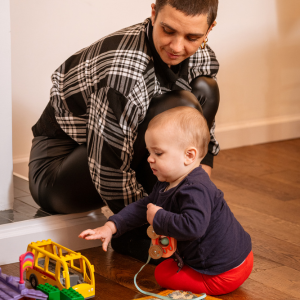Parenting is one of the most meaningful journeys a person can take—but it’s also one of the most confusing. There’s no manual, no perfect formula, and no single path to follow. However, one powerful way to better understand your approach as a parent is by identifying your parenting style.
Your parenting style influences how your child feels about themselves, how they relate to others, how they handle conflict, and how they grow emotionally and mentally. It’s one of the most impactful aspects of raising a child, and choosing the right one can make all the difference.
This comprehensive guide breaks down the different types of parenting styles, their effects, and how to find the best fit for you and your family. Whether you’re a new mom or already in the thick of raising toddlers or teens, understanding your parenting style will help you make more confident, informed decisions.
Table of Contents
What Is a Parenting Style?
A parenting style is the consistent pattern in how you interact with your child—how you discipline them, support them emotionally, communicate with them, and respond to their needs and behavior. Every parent has one, even if it’s unintentional.
Parenting styles are shaped by many factors:
- Your own upbringing
- Your cultural and religious values
- Your emotional intelligence
- Your level of stress or support
- Modern influences (social media, parenting books, peer groups)
The parenting style you choose sets the tone for your child’s development. It can support confidence or crush it. It can build trust or damage it. That’s why it’s so important to reflect on your approach.

The Four Main Parenting Styles (According to Psychology)
Renowned developmental psychologist Diana Baumrind first introduced the concept of parenting styles in the 1960s. Her framework was later expanded, but the four foundational types of parenting styles remain widely used:
- Authoritative Parenting
- Authoritarian Parenting
- Permissive Parenting
- Uninvolved (Neglectful) Parenting
Let’s look at each of these in depth.
1. Authoritative Parenting Style: The Gold Standard
The authoritative parenting style is often viewed as the healthiest and most balanced. It combines warmth with structure, and high expectations with strong emotional support.
Core Traits:
- Clear rules and expectations
- Warm and responsive
- Encourages independence
- Allows for mistakes and teaches through them
- Open communication and respect for opinions
Discipline Approach:
Authoritative parents use positive discipline strategies like setting limits, offering natural consequences, and using consistent follow-through without harshness.
Example in Action:
Your child forgets their homework. Instead of yelling, you help them understand the consequence at school and guide them in creating a reminder system.
Benefits:
- Builds emotional intelligence
- Encourages self-control and responsibility
- Fosters strong parent-child bonds
- Creates confident, respectful children
Potential Challenges:
- Requires more time, patience, and involvement
- Not always easy in high-stress or chaotic environments

2. Authoritarian Parenting Style: All About Obedience
This style is characterized by a strict, controlling approach. It’s based on high expectations but little emotional connection or flexibility.
Core Traits:
- Rigid rules with little explanation
- Strong focus on obedience
- Punishments are used over teaching
- Little room for dialogue or negotiation
Discipline Approach:
Discipline is often harsh and based on punishment. Parents expect instant compliance without discussing reasons.
Example in Action:
Your child talks back, and you immediately punish them without asking why they’re upset or explaining why the behavior is wrong.
Benefits:
- Provides structure and consistency
- Children often excel in structured environments like school or sports
Drawbacks:
- May lead to fear, low self-esteem, and rebellion
- Limits the emotional connection between parent and child
- Hinders decision-making and creativity
3. Permissive Parenting Style: Too Soft?
Permissive parents are warm and loving but struggle with enforcing rules. They often avoid conflict and let the child take the lead.
Core Traits:
- Few rules or expectations
- High emotional responsiveness
- Avoids discipline or structure
- Children have a lot of freedom and decision-making power
Discipline Approach:
Permissive parents may bribe, distract, or simply ignore misbehavior. They prefer to give in rather than enforce consequences.
Example in Action:
Your child refuses to go to bed on time, so you let them stay up to avoid a tantrum.
Benefits:
- Creates a nurturing, non-judgmental environment
- Encourages creativity and independence
Drawbacks:
- Lack of boundaries can lead to entitlement
- Children may struggle with authority and rules later
- Poor self-discipline and frustration tolerance
4. Uninvolved Parenting Style: Emotionally Absent
This style involves minimal involvement in a child’s life. Parents meet basic needs but offer little guidance, interaction, or emotional connection.
Core Traits:
- Low expectations and low responsiveness
- Emotionally distant or neglectful
- No consistent rules or discipline
- Often results from parental stress or trauma
Discipline Approach:
There’s usually no consistent discipline. Children are left to figure things out on their own.
Example in Action:
Your child is struggling in school, but you don’t check homework, attend meetings, or talk about their challenges.
Benefits:
- Promotes early independence (often prematurely)
Drawbacks:
- Serious emotional and behavioral consequences
- Leads to low self-esteem, poor academic performance, and difficulty forming healthy relationships
Parenting Style by Age: Adapting with Time
As your child grows, your parenting style should evolve too. What works for a toddler may not work for a teenager. Adapting your parenting style to your child’s age and stage ensures that you’re meeting their emotional and developmental needs effectively.
Infants (0–12 Months):
Focus on bonding and building trust. Be responsive, nurturing, and consistent. Gentle and attachment-based parenting works best during this stage.
Toddlers (1–3 Years):
Set firm yet loving boundaries. Toddlers thrive with routines, choices, and simple explanations. Authoritative parenting helps guide behavior while nurturing independence.
Preschoolers (3–5 Years):
Encourage curiosity, social interaction, and emotional expression. Use positive discipline, praise effort, and maintain consistent expectations.
School-Age (6–9 Years):
Help children build confidence and responsibility. Involve them in rule-setting and use logical consequences. Authoritative parenting continues to be effective here.
Tweens (10–12 Years):
Support identity development and growing autonomy. Shift from controlling to coaching. Listen actively and allow them space to express opinions.
Teenagers (13–18 Years):
Maintain respect, trust, and open communication. Teens need guidance, not control. Be emotionally available, set boundaries, and encourage problem-solving.
Across all ages, the authoritative parenting style stands out as the most balanced—offering warmth with structure, discipline with empathy. By adjusting your approach with each phase, you foster resilience, independence, and a lifelong parent-child bond.
Modern Parenting Styles You Need to Know in 2025
While traditional parenting styles like authoritative or authoritarian are still widely discussed, many parents today are embracing more mindful, emotionally focused approaches. These modern parenting styles are evolving with today’s challenges—technology, mental health awareness, and a deeper understanding of child psychology.
Let’s explore the most popular and effective modern parenting styles in 2025, especially for new moms who want to raise emotionally intelligent, resilient, and respectful children.
1. Gentle Parenting
Gentle parenting is rooted in empathy, connection, and respect. It encourages understanding your child’s behavior rather than reacting with punishment or control.
Key Traits:
- No yelling, spanking, or timeouts
- Emotionally responsive and calm
- Focus on guiding rather than punishing
- Encourages mutual respect and open communication
Best For: Parents who want a peaceful, respectful home without authoritarian control.
2. Attachment Parenting
Popularized by Dr. William Sears, this style emphasizes creating a deep, secure bond with your baby from infancy.
Key Traits:
- Babywearing, co-sleeping, extended breastfeeding
- Responding promptly to cries
- Prioritizing physical closeness and emotional security
Best For: New moms who want to foster deep connection and trust early on.
3. Positive Parenting
This approach focuses on reinforcing good behavior rather than punishing bad behavior. It’s all about proactive parenting.
Key Traits:
- Uses praise and encouragement
- Teaches self-regulation and natural consequences
- Promotes positive parent-child interactions
Best For: Parents who want to raise confident, cooperative kids through positive reinforcement.
4. Conscious Parenting
Popularized by Dr. Shefali Tsabary, this style asks parents to become more self-aware and emotionally grounded themselves.
Key Traits:
- Focuses on inner healing of the parent
- Sees children as mirrors of our unresolved emotions
- Teaches mindfulness in parenting responses
Best For: Parents who want to grow personally while raising emotionally attuned children.
5. Free-Range Parenting
Free-range parenting allows children more independence to explore, make choices, and take risks at an age-appropriate level.
Key Traits:
- Encourages autonomy and responsibility
- Limited supervision (within safe boundaries)
- Builds problem-solving and resilience
Best For: Parents who want to raise independent, confident kids with strong decision-making skills.
Choosing the Right Modern Parenting Style
You don’t have to pick just one. Many parents blend elements from several modern approaches depending on their child’s temperament and their family values.
For example:
- Combine gentle parenting’s emotional awareness with positive parenting’s praise system
- Use attachment parenting in infancy, then shift toward conscious parenting during school years
The goal is always the same: raise kind, confident, emotionally intelligent children in a home rooted in respect and love.
How to Identify Your Own Parenting Style
Many parents follow a style without realizing it. Becoming aware of your parenting style is the first step to intentional, conscious parenting.
Ask yourself these questions:
- Do I value obedience or independence more?
- How do I respond when my child breaks a rule?
- Do I explain the reason behind rules, or expect immediate compliance?
- Am I more reactive or calm during conflict?
- How often do I ask my child’s opinion?
Tips for Self-Assessment:
- Reflect on how your own parents raised you
- Ask your partner or trusted friends for feedback
- Take free online parenting style quizzes for insight
- Journal your daily interactions and emotional triggers
Knowing your style helps you adjust your approach and make better parenting choices aligned with your goals.
Which Parenting Style Is Best for Your Child’s Personality?
Every child is different—what works for one might not work for another. Matching your parenting style with your child’s personality builds trust and helps them thrive.
Examples:
- Introverted child: Needs gentle encouragement and emotional validation (gentle or authoritative parenting)
- Extroverted child: Needs boundaries and structured independence (authoritative or free-range)
- Highly sensitive child: Needs emotional safety and slow transitions (attachment or positive parenting)
- Strong-willed/spirited child: Needs consistency, mutual respect, and room for autonomy (conscious or authoritative)
Parenting is not one-size-fits-all. The key is to adapt your style to meet your child’s emotional and developmental needs.
Common Parenting Style Mistakes to Avoid
Even well-intentioned parents make mistakes. Recognizing these early can prevent long-term issues in your child’s emotional growth.
Top Mistakes:
- Inconsistency: Changing rules or routines too often confuses children
- Over-control: Micromanaging every decision kills confidence and independence
- Permissiveness: Saying “yes” too often creates entitlement and lack of discipline
- Ignoring Emotions: Dismissing feelings like “You’re fine” prevents emotional intelligence
- Not Adjusting: Sticking to one style as your child grows can cause friction
The best parenting comes from flexibility, reflection, and a willingness to improve.

How Culture and Upbringing Influence Parenting Styles
Our parenting is often shaped by how we were raised and the culture we come from.
Cultural influences can affect:
- How we discipline
- Our views on independence vs obedience
- Emotional expression in the household
- Gender roles and expectations
- Approach to education and achievement
For example, some Eastern cultures emphasize obedience and academic excellence, while Western styles may prioritize individuality and self-expression. Neither is wrong—but awareness helps create a conscious mix that serves your child best.
Can Parenting Styles Be Mixed? The Hybrid Approach
Absolutely! Real-life parenting often involves blending multiple styles depending on the situation, your values, and your child’s needs.
Examples of Hybrid Approaches:
- Authoritative + Gentle: Clear boundaries with emotional sensitivity
- Positive + Conscious: Praise-based discipline with mindful connection
- Attachment + Free-range: Deep bonding in early years with independence later
You don’t need to follow one method rigidly. What matters is consistency in values like respect, love, and safety.
Tips to Shift from One Parenting Style to Another
It’s never too late to change your parenting style. Whether you’re moving from authoritarian to authoritative, or permissive to positive, the shift can be life-changing.
Steps to shift:
- Reflect honestly on what’s not working
- Educate yourself about the style you want to adopt
- Communicate with your child—let them know change is coming
- Start small: Adjust tone, language, or discipline method gradually
- Be patient with yourself—mistakes are part of growth
Transformation takes time, but consistency builds new trust and healthier dynamics.
Parenting Style and Child Development: What the Research Says
Research consistently shows that parenting style directly impacts a child’s development—emotionally, socially, and academically.
Findings from studies:
- Authoritative parenting is linked to higher self-esteem, better school performance, and fewer behavioral issues.
- Authoritarian parenting may result in obedience but can create anxiety, low confidence, and poor social skills.
- Permissive parenting often leads to impulsiveness, lack of motivation, and poor boundaries.
- Uninvolved parenting can result in attachment issues, academic failure, and emotional insecurity.
Modern studies also highlight the benefits of gentle and positive parenting—boosting emotional regulation and secure attachments.
Choosing the Right Parenting Style for a Peaceful Home
A peaceful home doesn’t mean a quiet home—it means a safe, loving, emotionally regulated space where everyone feels respected.
What to focus on:
- Connection before correction
- Empathy in discipline
- Respectful communication
- Consistent routines
- Emotional safety
The right parenting style is one that balances love and boundaries, listens to your child’s voice, and evolves as your family grows. The goal isn’t perfection—but presence.
Why Do Psychologists Prefer Authoritative Parenting?
Authoritative parenting combines warmth and responsiveness with clear boundaries and expectations. It’s not overly strict like authoritarian parenting, and it’s not overly lenient like permissive or uninvolved styles.
Key Characteristics of Authoritative Parenting:
- High responsiveness: Parents are emotionally supportive, empathetic, and involved.
- High expectations: They set clear rules and enforce them consistently.
- Open communication: They listen to their child’s point of view and encourage dialogue.
- Encourages independence: Children are allowed to make age-appropriate choices.
Psychological Benefits for Children:
- Higher self-esteem
- Better emotional regulation
- Stronger academic performance
- Lower risk of anxiety and depression
- Good social skills and problem-solving abilities
In Contrast:
- Authoritarian parenting may lead to obedience but often causes low self-esteem and anxiety.
- Permissive parenting can foster creativity but often results in poor self-discipline and impulsiveness.
- Uninvolved parenting is associated with the most negative outcomes, like neglect and behavioral issues.
Conclusion: Understanding Parenting Styles
Choosing the right parenting style plays a crucial role in shaping a child’s emotional, social, and cognitive development. While every child and family is unique, research consistently shows that the authoritative parenting style offers the most balanced and positive outcomes. By combining warmth, structure, clear communication, and high expectations, authoritative parents help their children grow into confident, respectful, and emotionally intelligent individuals. Understanding your own parenting approach and making mindful adjustments can create a more nurturing and supportive environment where your child can truly thrive.








